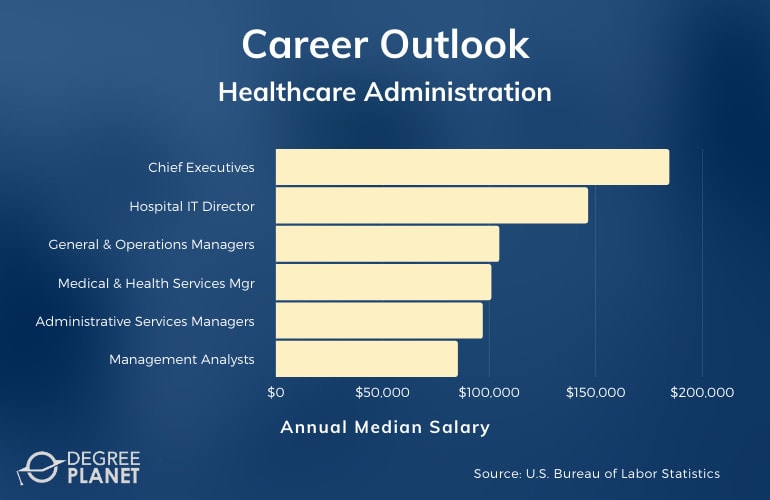Is a masters in healthcare administration worth it? Having this degree on your resume can help you become a great candidate for leadership roles in a variety of healthcare organizations.

Editorial Listing ShortCode:
Your work may help facilities run smoothly so that patients can receive excellent care.
Is a Masters in Healthcare Administration Degree Worth it?

Yes, a masters in healthcare administration is worth it for many students. According to the Bureau of Labor Statistics, management jobs are set to grow at 5% over the next 10 years, faster than the average for all occupations.
Common healthcare management careers in this field include practice administrator, operations manager, medical and health services manager, management consultant, and chief executive officer.
Careful administration keeps hospitals, group practices, long-term care facilities and other medical organizations running smoothly. As a medical administrator, you won’t perform clinical patient care, but you can still have the satisfaction of contributing to people’s wellbeing.
The work you do in the office may include budget preparation, staff oversight, supply management and regulatory compliance.
An online degree in healthcare administration can help you gain skills and knowledge that are essential for leadership roles in modern healthcare organizations. Your studies may cover healthcare delivery systems, public health, finance, information management and health law.

To tailor your school experience to your future career plans, you may be able to pursue a concentration, such as logistics, nonprofit leadership or informatics.
For your efforts, you may be rewarded with a generous salary. Income with a master’s degree in healthcare administration can vary, but it may be possible to work your way toward a six-figure salary.
According to the Bureau of Labor Statistics, some top directors and executives, such as hospital CEOs, hospital IT directors, and medical and health services managers, earn over $100,000 each year, on average.
Are online MHA programs worth it? Yes, based on the satisfaction that often comes with this career path, the essential knowledge that can be gained, and the high salary potential, may find it worth it!
5 Things You Can Do with a Masters in Healthcare Administration Degree
1. Operations Manager

Healthcare operations directors perform duties to ensure that patients receive the care they need from clinicians.
Inventory management might be your responsibility as an operations director. You may head up the team that procures medical supplies and distributes them to departments throughout your organization. Logistics training and knowledge of contract negotiation my be instrumental to your success.
Quality assurance might be another direction you could go with an operations career. Both customer service skills and a keen understanding of data analytics can help you improve patient satisfaction.
Based on Bureau of Labor Statistics data, operations managers earn an average of $103,650 per year.
2. Practice Administrator

Practice administrators make sure that the daily activities of a medical facility run smoothly. You my work in the office of a physician, a mental health provider or a dentist.
Many different employees or departments may report to you. For example, you might have the final say in matters of hiring and scheduling. You might also oversee budgets, advertisements and supply acquisition.
Editorial Listing ShortCode:
Being skilled in communication, financial management, and organizational leadership can help you succeed in this position. According to the Bureau of Labor Statistics, administrative services managers make an average annual salary of $98,890.
3. Management Consultant

Consultants can help influence the operations of many different medical organizations. In this job, you may help departments and facilities improve their administrative practices. You may gather data and analyze it for insights into an organization’s business practices. Strong computer and statistical skills can help you succeed in that area.
Being a clear communicator can also be very helpful. You may interview organization representatives to learn about their practices and then deliver presentations about your findings.
Previous experience as a healthcare administrator can help lend credence to your recommendations. The Bureau of Labor Statistics indicates that the average salary for a management analyst is $87,660.
4. Medical and Health Services Manager

If you oversee the activities of a healthcare facility or department, you may be known as a medical and health services manager. This job is needed in hospitals, public health departments and physicians’ groups. With special licensure, you may fulfill this role in a nursing home.
Health services managers have a lot of responsibilities on their plates, so being good at prioritizing and multitasking is beneficial. You might be in charge of staffing, training, budgeting and billing. Other tasks may include customer service and records management.
The average annual salary for medical and health services managers is $104,280, according to the Bureau of Labor Statistics.
5. Chief Executive Officer

The top executive of a hospital system, a pharmaceutical company or a medical supply manufacturer often holds the title of chief executive officer (CEO).
When you’re the CEO, many people may look to you for guidance, and all departments may ultimately report to you. The decisions you make and the leadership you provide can help set the direction for your organization. You will likely need to acquire a lot of administrative experience before being considered for this position.
CEOs have a number of responsibilities, but tend to be rewarded with high salaries: $185,950, on average, according to the Bureau of Labor Statistics.
Healthcare Administration Careers & Salaries

Doctors and nurses provide essential clinical care, but they don’t necessarily know the ins and outs of daily business operations in their facilities. That’s why healthcare administrators are needed in nearly every health organization.
As the aging population’s medical needs increase, there may be even more openings for administrators.
Editorial Listing ShortCode:
As a result, excellent job growth is expected in this sector over the next few years. According to the U.S. Bureau of Labor Statistics, positions for medical and health services managers are projected to rise 32% in the next decade. Plus, the average annual salary for master’s degree holders is $20,000 more than those with a bachelor’s degree. Some careers in the healthcare administration include:
| Careers | Annual Median Salary |
| Chief Executives | $185,950 |
| Hospital IT Director | $160,950 |
| Medical and Health Services Managers | $104,280 |
| General and Operations Manager | $103,650 |
| Administrative Services Managers | $98,890 |
| Nursing Home Administrators | $89,880 |
| Management Analysts | $87,660 |
If you want to increase your annual salary, consider pursing a doctorate in healthcare administration online instead.
MHA vs. MBA Programs

When you have your sights set on a healthcare leadership graduate degree, there are a few different options you can consider. One is a Master of Healthcare Administration. The other is a Master of Business Administration in Healthcare Administration.
Although there are some similarities between these two programs, there are also clear differences. An MHA program focuses on operations in the healthcare sector, but an MBA program can help you develop a broader business base and spend less time on health-specific studies.
| MHA | MBA |
| Specialized focus on healthcare leadership | Broad focus on many business principles |
| Designed for those with healthcare or business backgrounds | Often designed for those who want supplement their healthcare backgrounds with business knowledge |
| Courses in healthcare delivery, health finance and health information management | Courses in accounting, marketing and healthcare communications |
| Career options like practice administrator or health services manager | Career options like VP of operations or HR director |
It’s usually best to think through your future career goals before you settle the MHA or MBA debate. For a career focused on healthcare leadership, particularly in nonprofit healthcare facilities, an MHA might be the best choice.
If you have your sights set on leading a medical-supply corporation or want the flexibility to apply your skills outside of healthcare, an MBA may be a better choice.
Is an MHA Degree Worth It?

Yes, an MHA is worth it for many students. The Bureau of Labor Statistics projects 5% job growth in management occupations for the next 10 years, faster than the average for all occupations. Common careers in this field include operations manager, practice administrator, management consultant, medical and health services manager, and chief executive officer.
A Master of Healthcare Administration is a graduate program that can help equip you with the know-how and credentials for health leadership. Whether you already work in the healthcare sector or are coming from another field, this degree program can help you get ready to work as a healthcare administrator.
Not only is it possible to make good money with this degree, but you can also have the satisfaction of knowing that your work helps others experience health and healing.
What Can You Do with a Master’s Degree in Healthcare Administration?

There are many leadership roles available in healthcare organizations, and, an MHA can help you pursue many of them. For example, you might work as a practice administrator, a medical services manager, an operations director, a program manager or a performance improvement specialist. Some MHA graduates become CEOs.
Hospitals and doctors’ offices are common places of employment. You might also work in a dental office, a community healthcare clinic or a public health department. Long-term care facilities need administrators too, but special licensure is sometimes required.
Editorial Listing ShortCode:
You might also consider a career as a healthcare consultant who advises organizations on their administrative practices.
How Much Can You Make with a Masters in Healthcare Administration?

Your MHA earnings will depend on your job title and your place of employment. You might earn more as a medical services manager in a large hospital system than you would as the program director of a nonprofit community clinic.
Your experience level will influence your pay as well. The longer you’ve been working in this field, the more leverage you may have when it comes to salary negotiations.
Geographic location is another factor.
Which is Better MBA or MHA?

If you want to be a leader in health-related organizations, you might consider a Master of Business Administration in Healthcare Administration or a Master of Healthcare Administration. Either one can help you secure a good job with lucrative salary potential.
In fact, graduates of these two programs often fill similar roles in hospitals and other healthcare facilities.
Reviewing the curriculum lists of several different programs could help you decide which type appeals to you. For an MBA track, you’re likely to complete an extensive business core and just a few healthcare courses. In an MHA program, almost all of your classes will likely deal directly with health services.
What is a Master’s in Health Administration salary?

According to the Bureau of Labor Statistics, the average annual salary for master’s degree holders in this field is $90,000. Actual salary can vary greatly from one job title to another, though.
Employees with top spots in an organization may have the potential to earn even more.
On average, the Bureau of Labor Statistics says that medical and health services managers earn $104,280, while chief executive officers for health-related organizations may earn closer to $160,950 each year. These figures can vary based on employer, your work experience, and area of the country.
Getting Your Masters in Healthcare Administration Degree Online

Is an MHA degree worth it? If you want to be a healthcare administrator, this may an invaluable graduate degree to have on your resume. Your studies can help you learn advanced leadership skills for healthcare settings.
You don’t have to quit your full-time job to begin in graduate school. Instead, you can enroll in an online MHA program. Submit applications to these flexible programs to start working toward a future in healthcare administration.

